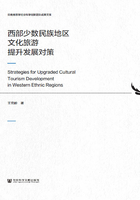
Preface
Cultural tourism refers to people's trip away from their normal residency to fulfil a cultural need with movements to cultural attractions aiming to gain new information and experiences. Given bordering locations, featured with inhabitancy of ethnic groups, taken a national perspective, the area of western ethnic regions in this paper refers to the following provinces: Yunnan, Guangxi, Inner Mongolia, Xinjiang and Tibet, all of which situate along P. R. China's border and are quite representative of western parts of China dwelt by ethnic groups. Therefore, terms of‘western parts of China dwelt by ethnic groups',‘western ethnic regions' and‘5 western ethnic provinces' in this paper all refer to this same geographic region.
Western parts of China, western ethnic regions in particular, are rich in natural and human tourism resources thanks to their wideness, ethnic groups, diversity of topographies and landscapes, and long history as well. So in these places tourism not only plays an important role in their economies, civilization and improvements of people's living standard, but also contributes to the inheritance, disseminations and prosperity of ethnic cultures. Due to constraints from their own histories, economic and social structures, tourism development in this area apparently lags behind the other counterparts of China, and is also inappropriate to their rich resources. In the tourism development process, some tourism constructions took place at the cost of cultural tourism resources or damages occurred with the constructions, for instance, adverse tourism impacts to traditional cultures, towns' loss of authenticity, unfair distribution of tourism revenue, and unbalanced regional development, all of which have squeezed the originally weak ethnic cultures into more vulnerable situations. In these regards, it is not only theoretically necessary, but also imperative to both elaborate and guide practices to carry out a study on how to balance the tourism development and cultural protection, inheritance and development(upgraded development)under the premise of good protection of ecologic environment of tourist destinations.
By taking advantages of researches of industrial economics and tourist anthropology, this paper studies on the tourism upgraded development in the western ethnic regions. Besides introduction and conclusion, the paper consists of three parts with seven chapters.
Part one covers chapter 2 and 3. Based on literature reviews of theories about tourism industry and cultural tourism home and abroad, the paper first assesses the status quo of and government policy supports to tourism development in western ethnic regions, followed by an investigation of the foundations, strategies and issues regarding cultural tourism development in the five western ethnic provinces. This part is the starting point and premise of the research.
Part two includes chapter 4 and 5. This part is an evaluation study aiming at sustainability of cultural tourism development in western ethnic regions. Applying Ko theory to the research, through analysis of resources and capabilities of the ethnic regions, this part will establish evaluation models(including BTS, ATSI)regarding sustainability of cultural tourism development in western ethnic regions; an assessment of the general level of sustainability and sustainability of individual factors of a specifically selected cultural tourist destination of“Yunnan province”followed by applying BTS and ATSI. Finally comes a case study of cultural tourism development in Lijiang prefecture, Yunnan province with a purpose of solid understanding of the status quo of sustainability of cultural tourism developments in western ethnic regions. An emphasis is placed on analysis of regime barriers and organic flaws arising from economic, administrative and legal arrangements which have impeded and will continue to impact the sustainable cultural tourism development in western ethnic regions. This part will set a solid foundation for the following researches on countermeasures.
Part three, being the core of this reseach, is chapter 6, a thematic research focused on counterpart measurements for upgrading development of cultural tourism in western ethnic regions. Based upon the precedent qualitative and quantative assessment of the selected tourist destinations, the author tentatively proposes measures and strategies for upgraded cultural tourism in western ethnic regions through multiple perspectives of governments, professional societies, communities, and enterprises.
Notwithstanding, there are many other important issues and topics worth while further investigation, for instance, excluding Yunnan province, to broaden research scope of cultural tourism development with field studies in other western ethnic regions; further studies on interactive relationship between the general cultural tourism markets and government bodies; researches on establishment of models regarding interactive relationship between markets and government bodies etc.